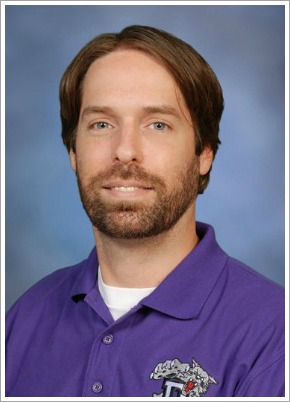A high school math teacher describes how his master’s degree allows him to view education through a wide lens, integrating theory and practice to best serve his students.

In high school, Bryan Schomaker always struggled with math.
“I didn’t really like it,” Schomaker said. “But part of the reason I didn’t like it was that I was afraid of it. I know a lot of people feel the same way about math.”
Schomaker’s fear of math dissipated after high school, when he began to approach the subject with a more positive mindset. After 12 years of working in a math-intensive field, Schomaker returned to school to earn a Master of Arts in Teaching degree, determined to help other students embrace mathematical concepts.
Schomaker enrolled in Emory University’s Master of Arts in Teaching (MAT) program focusing on secondary math education. Schomaker said Emory’s program first attracted him because of its well-recognized education department. At Emory, faculty members place heavy emphasis on both theoretical applications of education, as well as field experiences.
“I just felt like if I was going to get into the classroom and do a good job and do it right, I needed to get some of that instruction about educational theory and assessment theory,” Schomaker said. “From a practical sense, if I wanted to do the job right, and I wanted to be certified, the most sensible thing was to do an MAT program.”
The MAT program consists of a three-semester plan, where teachers learn about the philosophical background of education and classroom management, while also participating in student teaching opportunities. This gave Schomaker the chance to apply techniques learned in his program in a real-life setting.
Classroom Management Strategies
The following are a few ways teachers effectively manage classrooms:
- The following are a few ways teachers effectively manage classrooms:
- Create caring learning communities. Demand positive results, and help students reach goals
- Establish business-like learning environments
- Teach with assertion and clearly stated expectations
In the years before his MAT experience, Schomaker said he had developed opinions and ideas about teaching that he realized would not apply to everyone. Through his MAT program, Schomaker began to realize that many parts of teaching he thought were separate, were actually related.
“One of the things I felt like for [classroom management] was that it was a very separate thing,” said Schomaker. “Like teaching and instructing the kids and managing the kids were two different things. But we learned in this class, and what I’ve learned since being in the classroom myself, is that it’s all integrated.”
By developing good and effective lesson plans, and engaging students, Schomaker feels that teachers can avoid management issues. Schomaker said for teachers to develop these effective lesson plans, they must gain a solid sense of how to assess their practices.
Many teachers find that students don’t react positively to their teaching strategies, and are at a loss on how to adjust. Schomaker said his master’s program strongly emphasized assessing strategies, and making changes to better serve the needs of students.
“If you’re going to bother to teach, you want to have a way of figuring out if it’s working, right?” Schomaker said. “Assessment is just as much for you as a teacher as it is for the students. It helps you figure out where they are, and it helps you figure out where you are in terms of your goal of trying to teach the kids.”
Schomaker’s MAT program also heavily stressed the importance of learning theories of education, and the philosophical background behind the profession. At first, Schomaker wasn’t sure why he was reading and writing so much about education in a “romantic” way, but after a year in the classroom, he’s glad he did.
Schomaker said reading up on the philosophies of education helped him build a foundation for understanding the different ideas surrounding learning.
“You can build a well-rounded understanding of your place in the continuum in this thing we call education,” Schomaker said. “It’s not just you telling kids things in the classroom, it’s this whole community, collaborative effort, and you really need all of the pieces in place to make it work.”
Now, after finishing his first year of teaching high school math, Schomaker knows that the concepts and topics he studied in his master’s program have positively impacted his students. Today, he loves to meet students who dislike math to admit that it isn’t as bad as they thought, similar to his own high school experiences.
“One of the ways I can be most successful is that I can get kids to stop being afraid of it. One of the first ways for that, is for them to stop thinking that it sucks,” Schomaker says with a laugh. “The best thing about looking back on this first year is that there were a lot of kids that by the end of the year, thought, ‘maybe it’s not so bad.’”
Using the teaching practices and management skills he honed in his master’s program, Schomaker wants to drive his students to succeed, even in the areas they don’t believe success is possible.
“It’s about building confidence,” he said. “I think that applies to any teacher. I think we all sort of want that. We want our kids to be more confident in how they approach things, how they approach learning, and how they approach life.”
The following are a few philosophies of education that shape the field today
Constructivism: Humans are social animals and learn best when participating in real-life activities with other people.
Philosopher: Jean Piaget
Montessori Education: Children should be given choices when learning, with limits. Emphasizes freedom.
Philosopher: Maria Montessori
Classical Education Movement: Emphasizes a broad liberal arts education, gaining skills from multiple areas.
Philosopher: Charlotte Mason


